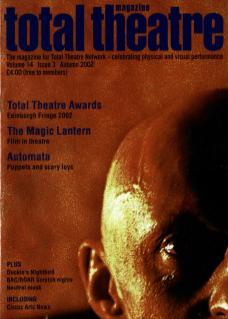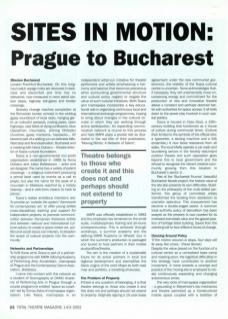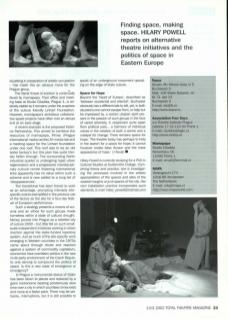Mission Bucharest
London-Frankfurt-Bucharest. On this long-haul coach voyage miles are devoured in darkness and discomfort and time has no relevance, now measured in neon petrol station stops, highway toll gates and border crossings.
Scenery change reaches completion at the Romanian border, echoed in the whirling gypsy soundtrack of local radio, hanging garlic on colourful parasols, rusting pipes, open highways, vast fields of dying sunflowers, blue Carpathian mountains, shining Orthodox churches, gypsy mansions, haystacks... All become part of a setting sun as darkness falls. Next stop and final destination: Bucharest and a meeting with Nona Ciobanu – theatre director of Toaca cultural foundation.
Toaca is a non-governmental non-profit organisation established in 1996 by Nona Ciobanu and Julian Baltestescu – actor and set designer. The name has a variety of potent meanings – a religious instrument producing a primal beat used by monks as a call to prayer, but also the name for the peak of a mountain in Moldavia reached by a rickety stairway – and in verb form it means 'to hack to pieces’!
Toaca's stated ambitious intentions are: ‘To provide an “outside the system” framework for contemporary art; to offer young artists cross-disciplinary training and support for independent projects; to promote communication between Romanian freelance artists and between national and international cultural values; to create a space where art, politics and social issues can interact; to broaden the scope of cultural projects into the community.’
Networks and Partnerships
To fulfil these aims Toaca is part of a partnership programme with MAPA (Moving Academy of Performing Arts) Amsterdam, mamapapa of Prague and the Contemporary Dance Association, Bratislava.
I came into contact with this network as a student of Scenography at DAMU Academy of Performing Arts in Prague through a course programme entitled 'space as a partner' led by Tomas Zizka of mamapapa organisation. Like Toaca, mamapapa is an independent artist-run initiative for theatre performers and artists emphasising a harmony and balance that becomes precarious when surrounding governmental structure and cultural policy neglect or negate the value of such cultural initiatives. Both Toaca and mamapapa incorporate a key educational role in organising continuous local and international exchange programmes, hoping to bring about changes in the cultural climate in which they are working through active participation. An expanding communication network is crucial to this process and here MAPA plays a pivotal role as illustrated in the apt title of their publication, Moving Minds: A Network of Talent.
MAPA was officially established in 1993 and the emphasis has remained on the small scale, multidisciplinary training and all-round entrepreneurship. This is achieved through workshops, a summer academy and the defining ‘MAPA Academy on Wheels' tour in which the summer's production is packaged and toured to host partners in their mobile studio/office/theatre.
The aim is the creation of a sustainable future for its active partners in local and regional development, and exemplifies the Slavic origins of the word Mapa as both road map and portfolio, a travelling showcase.
The Problem of Property
If there is any question of belonging, it is that theatre belongs to those who create it and this does not and perhaps should not extend to property. Originally signing a 15-year lease agreement under the new communist government, the stability of the Toaca cultural centre is uncertain. Nona acknowledges that, if necessary, they will unashamedly move on, conserving energy and commitment for the production of new and innovative theatre above a constant and perhaps doomed battle with authorities for space access. It all boils down to the power play involved in such spatial politics.
Toaca is housed in Casa Eliad, a 19th Century building that functioned as a house of culture during communist times. (Culture then limited to the symbols of the official arts: a typewriter, a sewing machine and a folk ensemble.) It now faces resistance from all sides. The local Mafia operate a car wash and laundering service in the forcibly redundant outdoor theatre and such opposition goes beyond this to local government and the refusal to recognise the vibrant creative community growing from this location in Bucharest's sector 3.
Part of the 'Bucharesti Frumos' (beautiful Bucharest) facade project, the historic value of the site also presents its own difficulties. Building on the philosophy of the multi-skilled performer, this group of committed artists transformed the building from dereliction to cosmetic splendour. This improvement has become a double-edged sword. A common local authority policy of demolition has been swayed as the property is now coveted for its increased real estate value and the gained position of heritage listed building. Saved from the wrecking ball to face different forces of change.
Dancing Around Policy
'If the motion around us stops, four days will fly away like crows.' (Pavel Storek)
Despite the value placed on the function of a cultural centre as a centralised base camp and meeting point, the logistical difficulties in this strategy have contributed to another movement. A move towards a concept and practice of the moving site is employed to create continuously expanding and changing autonomous zones.
The very roots of mamapapa organisation – a grounding in Meyerhold's bio-mechanics and theatre perceived as a constructivist mobile space coupled with a tradition of squatting in preparation of artistic occupation – has made this an obvious move for the Prague group.
The literal threat of eviction is continually faced by mamapapa. Their office and meeting base at Studio Citadela, Prague 1, is relatively stable as it remains under the auspices of the culture friendly Linhart Foundation. However, mamapapa's ambitious collaborative space projects have often met an abrupt end at an early stage.
A recent example is the proposed Kotelna Partnership. This aimed to combine the resources of mamapapa, Pimac (Prague international media centre),Tri-media lab and a meeting space for the Linhart foundation under one roof. This roof was to be an old boiler factory's but this plan has quite literally fallen through. The surrounding Karlin industrial quarter is undergoing rapid urban regeneration and a progressive interdisciplinary cultural centre fostering international links apparently has no value within such a scheme and is now added to a long list of 'disappearances'.
The transitional has been forced to work as an advantage, prompting intensely site-specific events exemplified in the previous use of the factory as the site for a four-day festival of European performance.
Such a strategy presents a means of survival and an ethos for such groups made homeless within a state of cultural drought. Money poured into Prague as a labelled city of culture 2000 – but little fell on such small-scale independent initiatives working in direct reaction against the state-funded repertory system. Just as much of the site-specific work emerging in Western countries in the 1970s came about through doubt and reaction against a system of commodity capitalism, economics have overtaken politics in the new multi-party environment of the Czech Republic only serving to compound the politics of space. Is this a new state of emergence or emergency?
In Prague a monumental statue of Stalin has been blown to pieces and replaced by a giant metronome beating ponderously slow time over a city in which countless times exist and move at a faster pace. There may be setbacks, interruptions, but it is still possible to speak of an underground movement operating on the edge of state culture.
Space for Hope
Beyond the 'heart of Europe', described as 'between occidental and oriental', Bucharest obviously has a different tale to tell, yet, in both situations one cannot escape from, or help but be impressed by, a certain utopian spirit present in the passion of such groups in the face of varied adversity. A utopianism quite apart from political past... a harmony of individual voices in the creation of both a centre and a catalyst for change. There remains space for hope: ‘The theatre today has perhaps to help in the search for a space for hope; it cannot however create false illusion and the mere appearance of hope.' (J Koval)
Hilary Powell is currently studying for a PhD in Cultural Studies at Goldsmiths College. Combining theory and practice, she is investigating the processes involved in the artistic appropriation of the spaces and sites of the wasted margins or junk spaces of the city. Her own installation practice incorporates such elements. E-mail: hilary powell@hotmail.com


